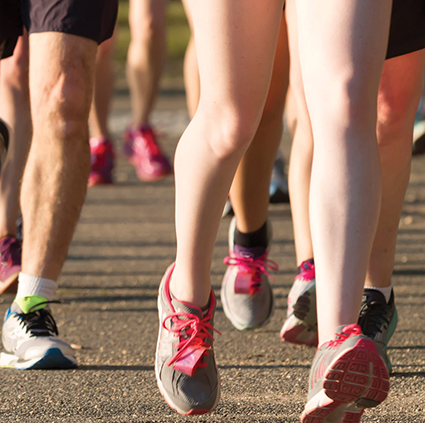
By Debbie Gardner
dgardner@thereminder.com
As a longtime member of the Pioneer Valley Women’s Running Club (http://www.pvwrc.org) and an experienced triathlete, Laurie Addams has lots of training in running – and swimming and biking – under her belt.
When Prime reached out to the PVWRC asking if someone would share advice for novice runners, Addams, who will compete in this June’s Springfield half-Ironman as the cyclist on a three-person relay team, was more than happy to pass along some tips on goal setting and training.
Here’s what Addams shared with us:
Q: If you are new to walking or running – what are some basic beginner goals?
“For a beginner, some good ones would be to run (or walk) 20 minutes with stopping, then run (or walk) 30 min without stopping. Those are typical goals just to prove to yourself that you can do it. Another good goal would be to make friends with like-minded people who will run (or walk) with you. When you get yourself into a group of runners you go along with what they are doing – ‘if you guys are trying [that longer run, or that race] I’ll go along.’
“Usually, a big beginner goal for running is to finish a 5K without walking. Then, once you meet some friends and they all go ‘we’re going to do a 10 K,’ – then you think, ‘I can do that.’ Some groups go on to do a half-marathon, others a full marathon, some like trail running.”
Q: As you gain stamina, what are some steps to boost your training?
“There are a whole bunch of different training programs out there. Overall, you should be looking for something you like to do. There are programs that have you run four days a week, five days a week … there’s a whole bunch online and you can almost customize your program. For example, there’s Jeff Galloway’s Run-Walk-Run (https://www.jeffgalloway.com/training/run-walk/) if that suits you. The biggest thing is to find a program that suits your need, fits your lifestyle and gets you where you want to go with your goals. There’s no one program that’s better than another.”
“An important tip for beginner runners is to add mileage slowly. Many say ‘I’m going to add a mile this week, and a mile next week’ – no, add a quarter mile this week, a half mile next week, or you’re going to overdo it. I know, I’ve done it … everybody I know has done it … and afterwards has said ‘Oh, that’s stupid.’
“Overall, one of the best things to do if you want to be a be a better runner is to run with better runners, there are studies that prove that!”
Q: What expectations should you have for that first event –be it a fundraising walk or a 5K?
“When I was training for my first triathlon I was told to ‘expect your finishing time to be more than what you do in the gym or the pool or at practice’ – don’t expect a great time on your first run. A good expectation would be to finish on your feet, even if it’s over your goal time. A good goal for something like a marathon would be to finish without walking, to finish and be happy. Don’t set yourself up for something that’s unrealistic and be ready for a bad day. Even the best runners have bad days.
“On the subject of races, in Western Mass., I think there are races that should be a rite of passage for every runner, some should-do, must-dos. One is the Bridge of Flowers Classic 8K/3K in Shelburne Falls in August, the Holyoke St. Patrick’s Road Race in March is also a must do, any race in Boston — it doesn’t have to be the Boston marathon, just run the city, and the Manchester Road Race in Connecticut is a must-do. When my daughter started running, I told her these are the must-do races. Once you’ve done them, you’ll see why. There’s something special about each one.”